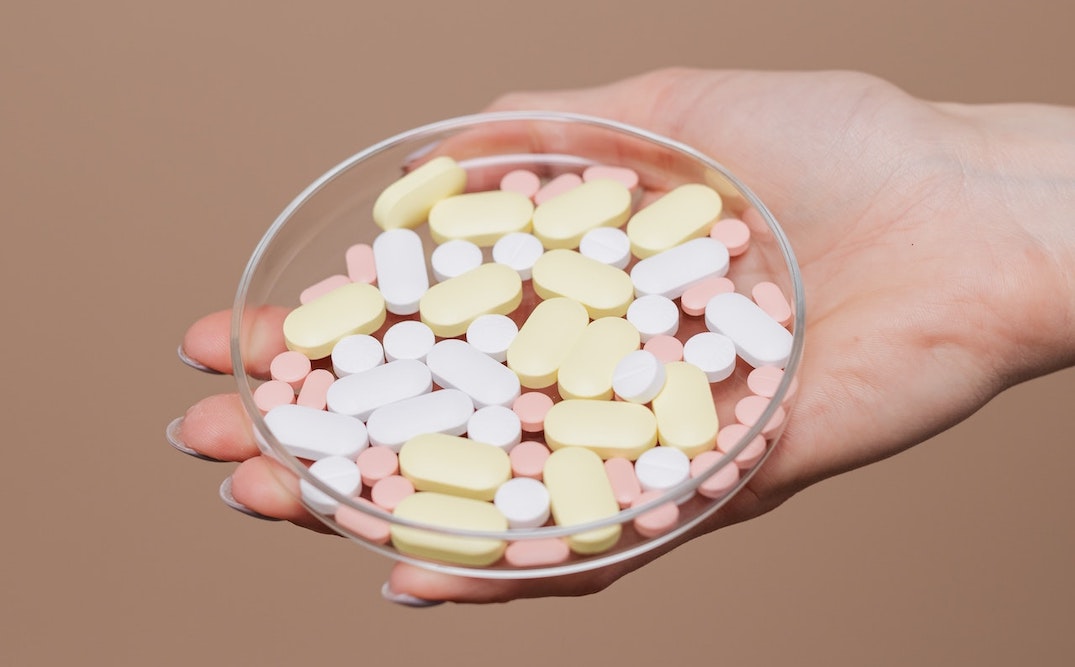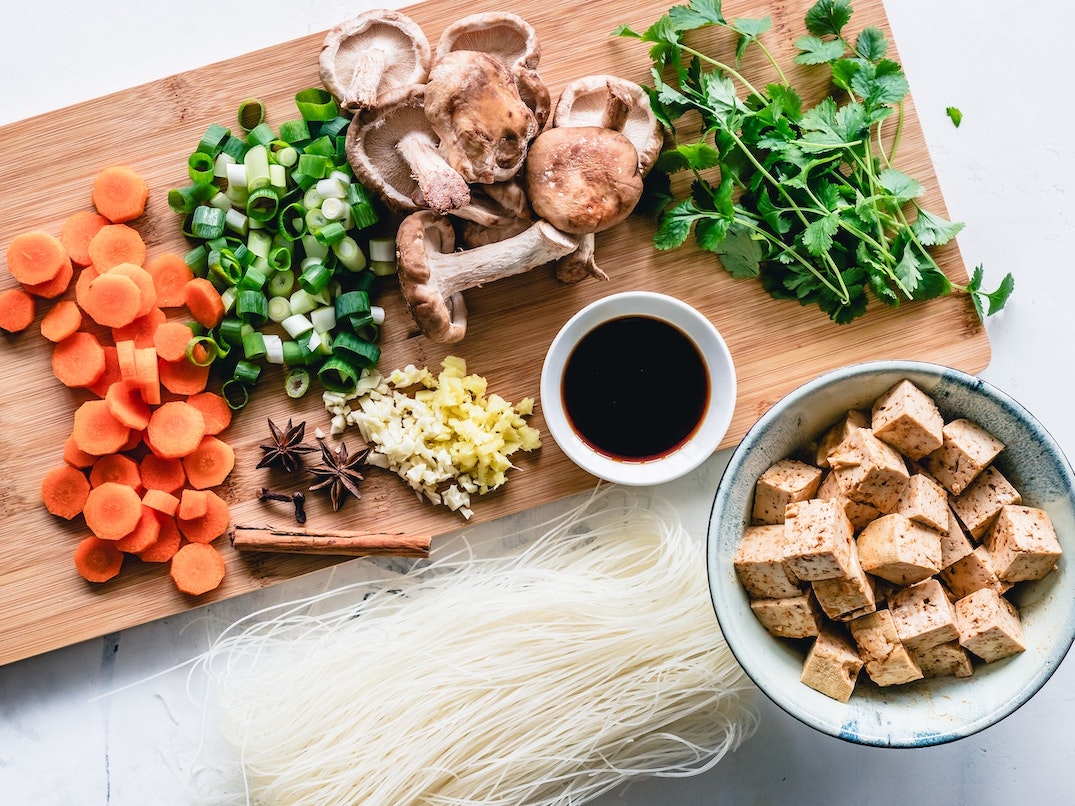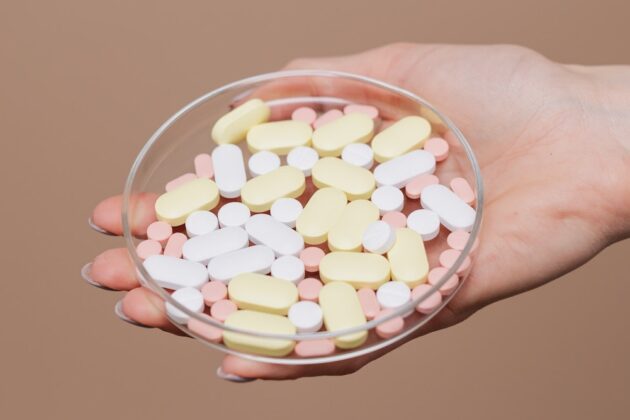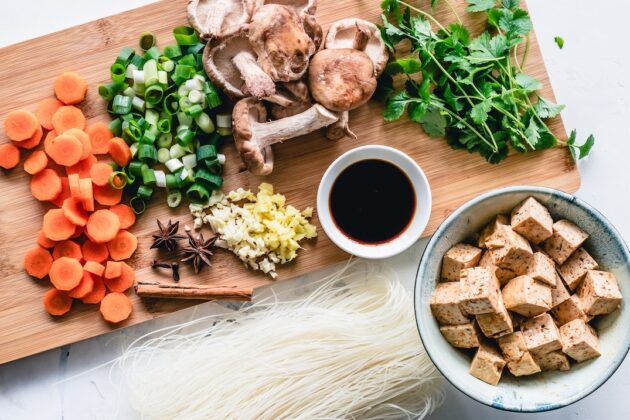GERD Diet: Foods to Eat & Avoid for Acid Reflux & Heartburn
Gastroesophageal Reflux Disease (GERD) is a common digestive disorder. It occurs when the lower esophageal sphincter (the muscle between the esophagus and stomach) becomes weak and allows stomach acid to move back up into the esophagus.
The most common symptom of GERD is heartburn, a burning sensation in your chest. Others include regurgitation, bitter taste, belching, nausea, and dry cough. More severe cases cause difficulty or pain while swallowing and vomiting.
Symptoms of GERD not only make you uncomfortable after eating, but they can also disrupt activities of daily life. Heartburn and acid reflux can interfere with physical activity, social gatherings, and can cause sleep disturbances.
Eating well can help prevent heartburn and acid reflux. To support healthy digestion, foods high in fiber and low in fat are often recommended to people with GERD. On the other hand, foods that are fried, acidic, or spicy can trigger symptoms and should be avoided.
This guide goes over what a healthy GERD diet looks like, including the best foods to eat for reducing acid reflux and heartburn, which to avoid, and more.
Best foods to eat if you have heartburn and acid reflux
Choosing the right foods on a daily basis is an important part of managing GERD. Knowing which foods to eat can prevent you from experiencing heartburn and acid reflux. Try incorporating these foods and drinks into your diet:
- High-fiber foods. Fiber supports healthy digestion and can help you feel fuller, which prevents you from overeating. Whole grains, fruits, vegetables, beans, and lentils are great sources of fiber.
- Alkaline foods. Alkaline foods have a high number on the pH scale (which measures how acidic or basic a food is), while acidic foods have a low number on the pH scale. In theory, consuming more alkaline foods may help offset stomach acid. While research on alkaline foods and GERD is limited, consuming more alkaline foods, such as bananas, melons, nuts, and cauliflower, may help prevent acid reflux. You can learn more about the best alkaline foods for GERD here.
- Ginger. Ginger contains anti-inflammatory properties and has been used as a natural remedy for nausea and other gastrointestinal issues. Incorporate more ginger by adding it to smoothies, stir-fries, or drinking ginger tea.
- Oatmeal. Oats absorb stomach acid, which can help prevent acid reflux. Oatmeal is also an excellent source of fiber, making it a great breakfast option for someone with GERD.
- Non-citrus fruits. Citrus fruits can make GERD symptoms worse because of their acid content. Opt for non-citrus fruits such as bananas, melons, apples, and pears.
- Vegetables. Most vegetables are naturally low in fat and high in fiber, so you can enjoy a wide variety of vegetables including leafy greens, broccoli, cauliflower, cucumbers, beets, and carrots. You may want to avoid tomatoes and onions as they can be potential triggers due to their acidity. Learn how a plant-based diet impacts acid reflux and heartburn here.
- Lean proteins. High-fat protein foods can sit in your stomach longer because they take longer to digest. This can make your stomach produce more acid and irritate your digestive system. To ensure you are consuming enough protein, choose lean proteins such as skinless poultry, fish, tofu, and beans.
- Whole grains. Whole grains are a good source of fiber and may help absorb stomach acid. Choose whole-grain bread, brown rice, whole-grain pasta, quinoa, and whole-grain cereals over refined grains.
- Almonds. Because of the low acidity of almonds, eating a small handful of raw almonds may help reduce symptoms of acid reflux.
- Healthy fats. Not all fats are created equal. While it is true that sticking to a low-fat diet will help manage GERD symptoms, healthy fats are still necessary nutrients. Healthy fats contain a variety of health benefits and anti-inflammatory properties. In moderation, choose healthy fat sources such as olive oil, avocados, nuts, seeds, and salmon.
- Non-fat milk. Everyone has different food tolerances. If you tolerate dairy, recent data indicates that there is no reason to completely avoid dairy if you have GERD. Choose non-fat milk and dairy products to avoid triggering symptoms.
- Dairy alternatives. If you know dairy causes or worsens your symptoms, it is best to eliminate it. Alternatives to dairy products (cheese, milk, and yogurt) are often made from plant sources such as almonds, oats, flaxseed, and coconut.
- Herbal teas. Herbal teas are non-acidic beverages that can soothe stomach issues, such as nausea, and improve digestion. An observational study done in 2017 concluded that herbal tea may be a good alternative to acid-suppressive drugs for people with GERD. Chamomile, licorice, slippery elm, ginger, and marshmallow root are good tea options. It is important to note that some herbs can interact with certain medications, so make sure you talk to your doctor before drinking herbal tea.
If you’re experiencing most of your symptoms late in the day, you may be interested in our guide to foods that can help with acid reflux and heartburn at night.

Get professional help managing acid reflux & heartburn
90% of Zaya Care patients pay $0 for visits with a Registered Dietitian
Foods that can cause heartburn and acid reflux
Consuming certain foods can immediately trigger symptoms like heartburn for some people. Try to avoid these foods and drinks as an important part of managing GERD:
- Fried and fatty foods. Fatty, fried, and greasy foods take a long time to digest. This puts more pressure on your stomach and esophagus. When your stomach stays full for a long period of time, it increases the risk of heartburn because your stomach produces more acid. Try to avoid foods like French fries, bacon, onion rings, potato chips, cheeseburgers, and doughnuts.
- Citrus fruits & other acidic foods. Acidic foods may irritate the esophagus and trigger acid reflux. These include lemons, limes, grapefruits, oranges, and pineapples, and may need to be avoided.
- Tomatoes and tomato-based products. Tomatoes and tomato-based products (such as salsa and pasta sauce) are highly acidic and can cause heartburn and acid reflux. For pasta lovers, consider other sauce options such as pesto or a low-fat alfredo sauce.
- Garlic and onions. Onions and garlic both can trigger heartburn and reflux due to their acidity. To avoid triggering symptoms, limit cooked onions and garlic to small amounts that you can tolerate.
- Spicy foods. Spicy foods can irritate the esophagus and exacerbate heartburn. To avoid worsening symptoms of GERD, avoid spicy foods, seasonings, and sauces such as hot sauce, cayenne pepper, chili powder, black pepper, and hot peppers.
- Pizza. Pizza is often made with lots of fatty meats and acidic vegetables. The combination of high fat and acidity can easily trigger heartburn and acid reflux. If you love pizza, you may want to choose those with white sauce, light cheese, lean meats, and no acidic veggies.
- Cheese. Certain cheeses can aggravate symptoms because of their fat and acid content. For some individuals, low-fat cheeses may be tolerated better than regular cheese.
- Chocolate. Chocolate contains both fat and caffeine. Some people find that chocolate induces GERD symptoms. If you are a chocolate lover, you may need to choose small portions in moderation depending on your tolerance.
- Peppermint. This is one herb that may worsen heartburn. Studies have suggested that peppermint relaxes the sphincter between the esophagus and stomach, which allows stomach acid to come back up.
- Carbonated beverages. Because of the carbonation and acid content, carbonated beverages may cause symptoms like fullness, belching, and heartburn.
- Coffee and caffeinated drinks. Caffeine has been identified as a possible trigger for symptoms of GERD in some people. However, caffeine does not have the same effect on everyone. Current evidence suggests that it is best to know your personal tolerance for beverages with caffeine.
- Alcohol. Heavy drinking has been shown to put people at risk for developing GERD. If you already have GERD, alcohol consumption can damage the inner lining of the esophagus, worsening symptoms.
Diet-related home remedies for heartburn and acid reflux
Even if you are following the best dietary advice, there may still be times you need fast-acting relief. Which foods neutralize stomach acid immediately? Try these tips:
- Drink water. Drinking plenty of water each day can help dilute acid and flush out the esophagus. Water is also a neutral liquid, which can counteract acidic foods.
- Drink baking soda and water. Because baking soda in water creates an alkaline solution, it is often used to neutralize excess stomach acid. This is often used as an immediate relief for heartburn.
- Chew gum. Chewing gum produces more saliva, which causes you to swallow more. This can help clear the esophagus.
- Consider supplementation. There are a few supplements that have been shown to help with GERD such as betaine HCL, B vitamins, and Iberogast. Just keep in mind that it’s important to talk to your doctor or nutritionist before starting any.
- Use slippery elm. Slippery elm is an herbal supplement that is made from the bark of a slippery elm tree. It is used as a natural remedy for sore throats, nausea, and heartburn. Although scientific evidence is lacking on this supplement, many people use slippery elm to help instantly relieve heartburn.
- Use aloe vera juice. In a pilot study, aloe vera syrup was identified as a safe method to reduce heartburn, nausea, and food regurgitation. Aloe vera also contains anti-inflammatory properties, which may benefit symptoms of GERD.
- Drink apple cider vinegar and water. Although there is little evidence to confirm that apple cider vinegar and water is a safe and effective method for heartburn and acid reflux, many people use it as a natural remedy for quick relief.
- Eat plain yogurt or other probiotic-rich foods. Probiotics are well known for their benefits to gut health. In a systematic review of 13 studies, it was concluded that probiotic foods can be beneficial for GERD symptoms. Adding probiotic-rich foods like kefir, kimchi, and sauerkraut to your diet may help reduce heartburn and acid reflux.
- Take an antacid. Antacids can be used as a quick relief for heartburn. Antacids counteract the acidity in your stomach, which helps alleviate acid reflux.
>> Find a GERD Nutritionist That Accepts Your Insurance
Example GERD diet plan
Below you can find a sample GERD diet plan that is around 2,000 calories and incorporates many of the best foods to eat with GERD listed above while avoiding those that can make it worse. You can also download a 7-day GERD diet plan PDF here.
Breakfast
- Oatmeal with bananas and a drizzle of honey (1 cup cooked oatmeal, 1 medium banana, 1 tbsp honey)
- Greek yogurt, plain, low-fat (1 cup)
- Green tea (1 cup)
Morning Snack
- A handful of almonds (around 23 nuts)
Lunch
- Grilled chicken salad: mixed greens, grilled chicken breast (3 oz), shredded carrots, cucumber, avocado (1/4 of a medium avocado), dressed with balsamic vinaigrette
- A whole wheat roll
Afternoon Snack
- Baby carrots with hummus (10 baby carrots, 2 tbsp hummus)
- One medium pear
Dinner
- Baked salmon (4 oz)
- Quinoa (1 cup, cooked)
- Steamed broccoli (1 cup)
- A side salad (mixed greens, cherry tomatoes, and cucumber, with olive oil and lemon juice dressing)
Evening Snack
- Greek yogurt, plain, low-fat (1 cup)
- Blueberries (1/2 cup)
How diet affects GERD
What you eat plays a major role in controlling symptoms of GERD. Focusing on certain foods, such as those high in fiber, low in fat, and low in acid, can help prevent symptoms from recurring and improve your quality of life.
On the other hand, consuming certain foods such as fried foods, acidic foods, and spicy foods can trigger symptoms. Not paying attention to your diet can make you feel uncomfortable after eating and make it more difficult to get your symptoms under control.
Your diet also plays a role in managing your body weight. Being overweight is a major risk factor for developing GERD. For those who already have GERD, a healthy diet will help promote a healthy body weight and can prevent heartburn and acid reflux from getting worse.

Get professional help managing acid reflux & heartburn
90% of Zaya Care patients pay $0 for visits with a Registered Dietitian
Why you should consider working with a GERD nutritionist
Because there are so many foods that can improve or worsen symptoms, planning your own meals with GERD is not easy to do alone. Working with a GERD nutritionist is almost always worth it as they can help you avoid the challenges and frustrations that may come with managing GERD through diet.
A GERD nutritionist will get to know your habits, preferences, and intolerances. A nutritionist can help you identify which foods aggravate your symptoms and will provide the best alternatives to those foods.
Following a diet plan for GERD may involve food restrictions. A nutritionist can help identify key nutrients you may be missing and come up with a plan to avoid nutritional deficiencies.
Not only can working with a GERD nutritionist help manage your symptoms, but it can also help you adopt nutrition habits that will support a healthy body weight. Maintaining a healthy body weight benefits all aspects of your health.
Working with a GERD nutritionist can take away the stress of making daily food choices. A nutritionist can help you create a personalized plan of action that will meet your nutrition needs, reduce your symptoms, and that you can adhere to long-term.
Here at Zaya Care, we can match you with GERD nutritionists that are covered by your insurance. You can browse our network of nutritionists and filter by things like visit type, languages spoken, insurance accepted, and more to find your fit.
Other tips for managing acid reflux & heartburn
Managing GERD may require a combination of medication, diet, and lifestyle changes. Lifestyle changes for managing acid reflux and heartburn are generally safe and effective and can benefit other areas of your health. Try these tips:
- Maintain a healthy weight. Excessive body weight may contribute to symptoms of GERD. One study showed that patients who are overweight ended up improving their GERD symptoms after following a structured weight loss program for six months.
- Elevate the head of your bed. Elevating your head while sleeping has been proven to prevent acid from flowing back up your esophagus. Many studies have confirmed that elevating the head of your bed is an effective way to relieve GERD symptoms.
- Avoid lying down immediately after eating. Lying down immediately after eating can slow digestion and cause indigestion. For patients with GERD, it is generally recommended to avoid lying down or sleeping within three hours of eating to avoid worsening GERD symptoms.
- Wear loose-fitting clothing. Wearing tight clothing can cause discomfort around your abdomen. Wearing loose-fitting clothing can prevent constriction around your stomach and help alleviate acid reflux.
- Quit smoking. Smoking is considered a risk factor for new-onset GERD. Additionally, research has found that successful smoking cessation in patients with GERD has resulted in fewer symptoms and better well-being.
- Manage stress. Chronic stress can hurt physical health in many ways. A 2015 study found that almost half of the 12,653 patients interviewed reported that stress was the most common lifestyle factor that contributed to their GERD symptoms. Managing your stress not only can improve symptoms of GERD but also improve your overall health.
- Avoid exercising immediately after meals. Exercise is an important part of health and maintaining a healthy body weight. However, exercising immediately after eating can trigger reflux. It is generally recommended to allow at least one to two hours to pass after eating to give enough time for food to move through your stomach.
- Sleep on your left side. A 2015 randomized control trial found that participants who slept with their left side down had fewer reflux episodes. Because of how your stomach is shaped, gravity will keep contents in your stomach where they belong while you sleep on your left side.
- Avoid tight belts or waistbands. Tight belts, especially around your stomach, can cause more abdominal pressure. This can increase gastroesophageal reflux. To avoid reflux following a meal, avoid wearing tight belts.

Get professional help managing acid reflux & heartburn
90% of Zaya Care patients pay $0 for visits with a Registered Dietitian
Gastroesophageal Reflux Disease (GERD) is a common digestive disorder. It occurs when the lower esophageal sphincter (the muscle between the esophagus and stomach) becomes weak and allows stomach acid to move back up into the esophagus.
The most common symptom of GERD is heartburn, a burning sensation in your chest. Others include regurgitation, bitter taste, belching, nausea, and dry cough. More severe cases cause difficulty or pain while swallowing and vomiting.
Symptoms of GERD not only make you uncomfortable after eating, but they can also disrupt activities of daily life. Heartburn and acid reflux can interfere with physical activity, social gatherings, and can cause sleep disturbances.
Eating well can help prevent heartburn and acid reflux. To support healthy digestion, foods high in fiber and low in fat are often recommended to people with GERD. On the other hand, foods that are fried, acidic, or spicy can trigger symptoms and should be avoided.
This guide goes over what a healthy GERD diet looks like, including the best foods to eat for reducing acid reflux and heartburn, which to avoid, and more.
Best foods to eat if you have heartburn and acid reflux
Choosing the right foods on a daily basis is an important part of managing GERD. Knowing which foods to eat can prevent you from experiencing heartburn and acid reflux. Try incorporating these foods and drinks into your diet:
- High-fiber foods. Fiber supports healthy digestion and can help you feel fuller, which prevents you from overeating. Whole grains, fruits, vegetables, beans, and lentils are great sources of fiber.
- Alkaline foods. Alkaline foods have a high number on the pH scale (which measures how acidic or basic a food is), while acidic foods have a low number on the pH scale. In theory, consuming more alkaline foods may help offset stomach acid. While research on alkaline foods and GERD is limited, consuming more alkaline foods, such as bananas, melons, nuts, and cauliflower, may help prevent acid reflux. You can learn more about the best alkaline foods for GERD here.
- Ginger. Ginger contains anti-inflammatory properties and has been used as a natural remedy for nausea and other gastrointestinal issues. Incorporate more ginger by adding it to smoothies, stir-fries, or drinking ginger tea.
- Oatmeal. Oats absorb stomach acid, which can help prevent acid reflux. Oatmeal is also an excellent source of fiber, making it a great breakfast option for someone with GERD.
- Non-citrus fruits. Citrus fruits can make GERD symptoms worse because of their acid content. Opt for non-citrus fruits such as bananas, melons, apples, and pears.
- Vegetables. Most vegetables are naturally low in fat and high in fiber, so you can enjoy a wide variety of vegetables including leafy greens, broccoli, cauliflower, cucumbers, beets, and carrots. You may want to avoid tomatoes and onions as they can be potential triggers due to their acidity. Learn how a plant-based diet impacts acid reflux and heartburn here.
- Lean proteins. High-fat protein foods can sit in your stomach longer because they take longer to digest. This can make your stomach produce more acid and irritate your digestive system. To ensure you are consuming enough protein, choose lean proteins such as skinless poultry, fish, tofu, and beans.
- Whole grains. Whole grains are a good source of fiber and may help absorb stomach acid. Choose whole-grain bread, brown rice, whole-grain pasta, quinoa, and whole-grain cereals over refined grains.
- Almonds. Because of the low acidity of almonds, eating a small handful of raw almonds may help reduce symptoms of acid reflux.
- Healthy fats. Not all fats are created equal. While it is true that sticking to a low-fat diet will help manage GERD symptoms, healthy fats are still necessary nutrients. Healthy fats contain a variety of health benefits and anti-inflammatory properties. In moderation, choose healthy fat sources such as olive oil, avocados, nuts, seeds, and salmon.
- Non-fat milk. Everyone has different food tolerances. If you tolerate dairy, recent data indicates that there is no reason to completely avoid dairy if you have GERD. Choose non-fat milk and dairy products to avoid triggering symptoms.
- Dairy alternatives. If you know dairy causes or worsens your symptoms, it is best to eliminate it. Alternatives to dairy products (cheese, milk, and yogurt) are often made from plant sources such as almonds, oats, flaxseed, and coconut.
- Herbal teas. Herbal teas are non-acidic beverages that can soothe stomach issues, such as nausea, and improve digestion. An observational study done in 2017 concluded that herbal tea may be a good alternative to acid-suppressive drugs for people with GERD. Chamomile, licorice, slippery elm, ginger, and marshmallow root are good tea options. It is important to note that some herbs can interact with certain medications, so make sure you talk to your doctor before drinking herbal tea.
If you’re experiencing most of your symptoms late in the day, you may be interested in our guide to foods that can help with acid reflux and heartburn at night.

Get professional help managing acid reflux & heartburn
90% of Zaya Care patients pay $0 for visits with a Registered Dietitian
Foods that can cause heartburn and acid reflux
Consuming certain foods can immediately trigger symptoms like heartburn for some people. Try to avoid these foods and drinks as an important part of managing GERD:
- Fried and fatty foods. Fatty, fried, and greasy foods take a long time to digest. This puts more pressure on your stomach and esophagus. When your stomach stays full for a long period of time, it increases the risk of heartburn because your stomach produces more acid. Try to avoid foods like French fries, bacon, onion rings, potato chips, cheeseburgers, and doughnuts.
- Citrus fruits & other acidic foods. Acidic foods may irritate the esophagus and trigger acid reflux. These include lemons, limes, grapefruits, oranges, and pineapples, and may need to be avoided.
- Tomatoes and tomato-based products. Tomatoes and tomato-based products (such as salsa and pasta sauce) are highly acidic and can cause heartburn and acid reflux. For pasta lovers, consider other sauce options such as pesto or a low-fat alfredo sauce.
- Garlic and onions. Onions and garlic both can trigger heartburn and reflux due to their acidity. To avoid triggering symptoms, limit cooked onions and garlic to small amounts that you can tolerate.
- Spicy foods. Spicy foods can irritate the esophagus and exacerbate heartburn. To avoid worsening symptoms of GERD, avoid spicy foods, seasonings, and sauces such as hot sauce, cayenne pepper, chili powder, black pepper, and hot peppers.
- Pizza. Pizza is often made with lots of fatty meats and acidic vegetables. The combination of high fat and acidity can easily trigger heartburn and acid reflux. If you love pizza, you may want to choose those with white sauce, light cheese, lean meats, and no acidic veggies.
- Cheese. Certain cheeses can aggravate symptoms because of their fat and acid content. For some individuals, low-fat cheeses may be tolerated better than regular cheese.
- Chocolate. Chocolate contains both fat and caffeine. Some people find that chocolate induces GERD symptoms. If you are a chocolate lover, you may need to choose small portions in moderation depending on your tolerance.
- Peppermint. This is one herb that may worsen heartburn. Studies have suggested that peppermint relaxes the sphincter between the esophagus and stomach, which allows stomach acid to come back up.
- Carbonated beverages. Because of the carbonation and acid content, carbonated beverages may cause symptoms like fullness, belching, and heartburn.
- Coffee and caffeinated drinks. Caffeine has been identified as a possible trigger for symptoms of GERD in some people. However, caffeine does not have the same effect on everyone. Current evidence suggests that it is best to know your personal tolerance for beverages with caffeine.
- Alcohol. Heavy drinking has been shown to put people at risk for developing GERD. If you already have GERD, alcohol consumption can damage the inner lining of the esophagus, worsening symptoms.
Diet-related home remedies for heartburn and acid reflux
Even if you are following the best dietary advice, there may still be times you need fast-acting relief. Which foods neutralize stomach acid immediately? Try these tips:
- Drink water. Drinking plenty of water each day can help dilute acid and flush out the esophagus. Water is also a neutral liquid, which can counteract acidic foods.
- Drink baking soda and water. Because baking soda in water creates an alkaline solution, it is often used to neutralize excess stomach acid. This is often used as an immediate relief for heartburn.
- Chew gum. Chewing gum produces more saliva, which causes you to swallow more. This can help clear the esophagus.
- Consider supplementation. There are a few supplements that have been shown to help with GERD such as betaine HCL, B vitamins, and Iberogast. Just keep in mind that it’s important to talk to your doctor or nutritionist before starting any.
- Use slippery elm. Slippery elm is an herbal supplement that is made from the bark of a slippery elm tree. It is used as a natural remedy for sore throats, nausea, and heartburn. Although scientific evidence is lacking on this supplement, many people use slippery elm to help instantly relieve heartburn.
- Use aloe vera juice. In a pilot study, aloe vera syrup was identified as a safe method to reduce heartburn, nausea, and food regurgitation. Aloe vera also contains anti-inflammatory properties, which may benefit symptoms of GERD.
- Drink apple cider vinegar and water. Although there is little evidence to confirm that apple cider vinegar and water is a safe and effective method for heartburn and acid reflux, many people use it as a natural remedy for quick relief.
- Eat plain yogurt or other probiotic-rich foods. Probiotics are well known for their benefits to gut health. In a systematic review of 13 studies, it was concluded that probiotic foods can be beneficial for GERD symptoms. Adding probiotic-rich foods like kefir, kimchi, and sauerkraut to your diet may help reduce heartburn and acid reflux.
- Take an antacid. Antacids can be used as a quick relief for heartburn. Antacids counteract the acidity in your stomach, which helps alleviate acid reflux.
>> Find a GERD Nutritionist That Accepts Your Insurance
Example GERD diet plan
Below you can find a sample GERD diet plan that is around 2,000 calories and incorporates many of the best foods to eat with GERD listed above while avoiding those that can make it worse. You can also download a 7-day GERD diet plan PDF here.
Breakfast
- Oatmeal with bananas and a drizzle of honey (1 cup cooked oatmeal, 1 medium banana, 1 tbsp honey)
- Greek yogurt, plain, low-fat (1 cup)
- Green tea (1 cup)
Morning Snack
- A handful of almonds (around 23 nuts)
Lunch
- Grilled chicken salad: mixed greens, grilled chicken breast (3 oz), shredded carrots, cucumber, avocado (1/4 of a medium avocado), dressed with balsamic vinaigrette
- A whole wheat roll
Afternoon Snack
- Baby carrots with hummus (10 baby carrots, 2 tbsp hummus)
- One medium pear
Dinner
- Baked salmon (4 oz)
- Quinoa (1 cup, cooked)
- Steamed broccoli (1 cup)
- A side salad (mixed greens, cherry tomatoes, and cucumber, with olive oil and lemon juice dressing)
Evening Snack
- Greek yogurt, plain, low-fat (1 cup)
- Blueberries (1/2 cup)
How diet affects GERD
What you eat plays a major role in controlling symptoms of GERD. Focusing on certain foods, such as those high in fiber, low in fat, and low in acid, can help prevent symptoms from recurring and improve your quality of life.
On the other hand, consuming certain foods such as fried foods, acidic foods, and spicy foods can trigger symptoms. Not paying attention to your diet can make you feel uncomfortable after eating and make it more difficult to get your symptoms under control.
Your diet also plays a role in managing your body weight. Being overweight is a major risk factor for developing GERD. For those who already have GERD, a healthy diet will help promote a healthy body weight and can prevent heartburn and acid reflux from getting worse.

Get professional help managing acid reflux & heartburn
90% of Zaya Care patients pay $0 for visits with a Registered Dietitian
Why you should consider working with a GERD nutritionist
Because there are so many foods that can improve or worsen symptoms, planning your own meals with GERD is not easy to do alone. Working with a GERD nutritionist is almost always worth it as they can help you avoid the challenges and frustrations that may come with managing GERD through diet.
A GERD nutritionist will get to know your habits, preferences, and intolerances. A nutritionist can help you identify which foods aggravate your symptoms and will provide the best alternatives to those foods.
Following a diet plan for GERD may involve food restrictions. A nutritionist can help identify key nutrients you may be missing and come up with a plan to avoid nutritional deficiencies.
Not only can working with a GERD nutritionist help manage your symptoms, but it can also help you adopt nutrition habits that will support a healthy body weight. Maintaining a healthy body weight benefits all aspects of your health.
Working with a GERD nutritionist can take away the stress of making daily food choices. A nutritionist can help you create a personalized plan of action that will meet your nutrition needs, reduce your symptoms, and that you can adhere to long-term.
Here at Zaya Care, we can match you with GERD nutritionists that are covered by your insurance. You can browse our network of nutritionists and filter by things like visit type, languages spoken, insurance accepted, and more to find your fit.
Other tips for managing acid reflux & heartburn
Managing GERD may require a combination of medication, diet, and lifestyle changes. Lifestyle changes for managing acid reflux and heartburn are generally safe and effective and can benefit other areas of your health. Try these tips:
- Maintain a healthy weight. Excessive body weight may contribute to symptoms of GERD. One study showed that patients who are overweight ended up improving their GERD symptoms after following a structured weight loss program for six months.
- Elevate the head of your bed. Elevating your head while sleeping has been proven to prevent acid from flowing back up your esophagus. Many studies have confirmed that elevating the head of your bed is an effective way to relieve GERD symptoms.
- Avoid lying down immediately after eating. Lying down immediately after eating can slow digestion and cause indigestion. For patients with GERD, it is generally recommended to avoid lying down or sleeping within three hours of eating to avoid worsening GERD symptoms.
- Wear loose-fitting clothing. Wearing tight clothing can cause discomfort around your abdomen. Wearing loose-fitting clothing can prevent constriction around your stomach and help alleviate acid reflux.
- Quit smoking. Smoking is considered a risk factor for new-onset GERD. Additionally, research has found that successful smoking cessation in patients with GERD has resulted in fewer symptoms and better well-being.
- Manage stress. Chronic stress can hurt physical health in many ways. A 2015 study found that almost half of the 12,653 patients interviewed reported that stress was the most common lifestyle factor that contributed to their GERD symptoms. Managing your stress not only can improve symptoms of GERD but also improve your overall health.
- Avoid exercising immediately after meals. Exercise is an important part of health and maintaining a healthy body weight. However, exercising immediately after eating can trigger reflux. It is generally recommended to allow at least one to two hours to pass after eating to give enough time for food to move through your stomach.
- Sleep on your left side. A 2015 randomized control trial found that participants who slept with their left side down had fewer reflux episodes. Because of how your stomach is shaped, gravity will keep contents in your stomach where they belong while you sleep on your left side.
- Avoid tight belts or waistbands. Tight belts, especially around your stomach, can cause more abdominal pressure. This can increase gastroesophageal reflux. To avoid reflux following a meal, avoid wearing tight belts.

Get professional help managing acid reflux & heartburn
90% of Zaya Care patients pay $0 for visits with a Registered Dietitian
















